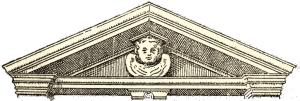 |
|||||
|
|
|||||
|
João Paulo Freire e Carlos de Passos, Mafra, Col. Monumentos de Portugal, nº 1, Porto, Ed. Litografia Nacional, 1933 |
|||||
|
|
|||||
|
|
|||||
|
MAFRA – IT'S ANTIQUITY AND HISTORICAL VALUE |
|||||
|
The spot was peopled in prehistorical times, as is proved by several caves discovered there and by hatchets of polished stone. A cemetery dating from Roman times and coins of Tiberius and Theodosius I have been brought to Iight. For a length of time the Arabs held dominion there, and to them has been attributed the origin of its name of Mafra, meaning cavern. That, however, lacks justlflcation. In 1146 Afonso Henriques (1st King of Portugal) took from the Moors the Castle, which remained in the possession of the Crown in 1193, for in that year it was ceded to the military and religious order of Évora.(1) ln the reign of Afonso III it returned to the possession of the Crown. ln 1289 king D. Dinis exchanged it for the castle of Portel, which belonged to Maria Annes de Alvim. From the time of this lady began the particular dominion of the town of Mafra, which lasted until the death of the last Marquis of Ponte de Lima. The marquis descended from the Viscounts of Cerveira whose family received the dominion of Mafra by the 8th viscount's marrying Joana de Vasconcelos e Menezes (1648). ln the ancient town exists the Church of St. Andrew, the old mother-church (of which Pedro Julião or Hispanus was the / 110 / prior, before becomirig the famous Pope John XXI), and a beautiful example of primary Gothic of the transition period from the 13th to the 14th century, although sadly neglected and in ruin. In the nave can be seen two large tombs of lias stone. They belong to the 14th century and are those of the ancient lards of Mafra, Diogo Afonso de Sousa and his wife. |
|||||
|
______________________________ (1) – This military order was founded by Afonso Henriques in 1166. It followed the role of St. Benedict (the reformed Cistercian one) and was subject to Calatrava. ln 1211 it removed from Évora to Avis which name it took, and in 1213 became independent. |
|||||
|
|
|||||
|




